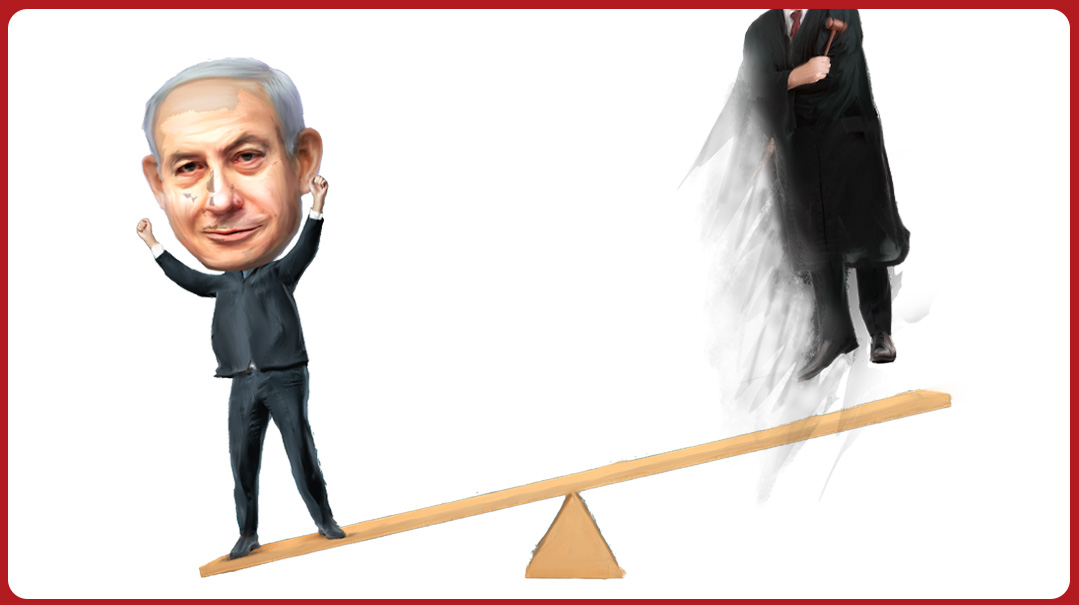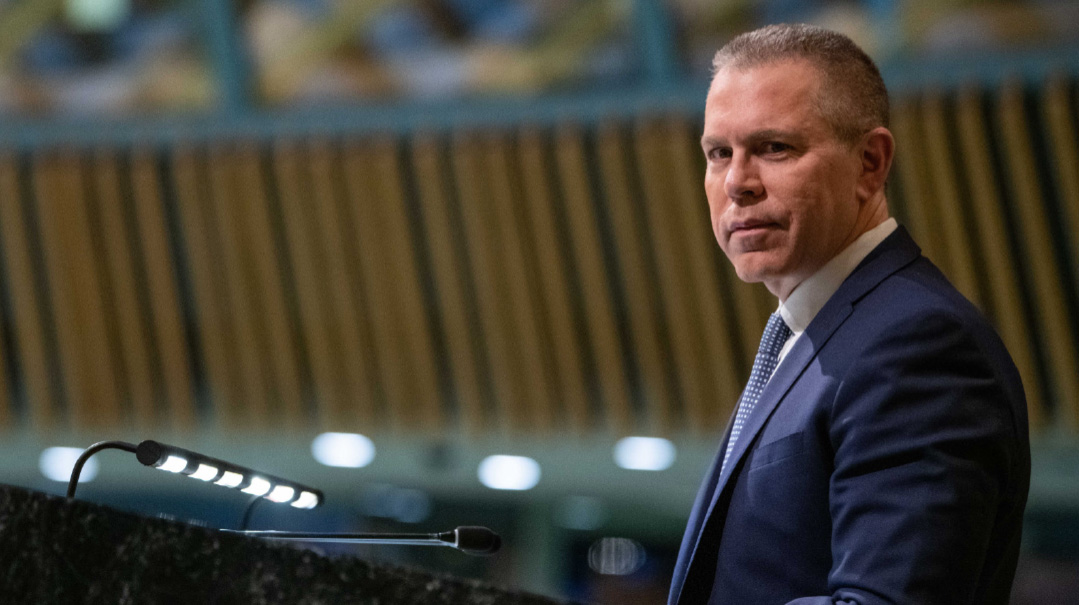Court of Flaw

In battle over Court, Left won't go quietly

Last week Israel saw a political reaction that made the chaos of the last four years pale by comparison. The opening salvo was fired by Justice Minister Yariv Levin, who announced a massive judicial reform that would dramatically alter the balance of power between the branches of government after just a week on the job.
The response wasn’t long in coming, bringing forward the true spearheads of resistance.
Yesh Atid chair Lapid and National Union chair Gantz both issued fiery statements, but the one who grabbed the headlines was Aharon Barak, former president of the High Court and father of the 1995 constitutional revolution that gave the Knesset’s Basic Laws constitutional status, and the High Court the power to overturn Knesset laws and ultimately supplant the legislature at the top of the political hierarchy.
In a melodramatic interview, the 86-year-old Barak went all out. “If my death will end the crisis, then put me in front of a firing squad,” he said, calling Levin’s reforms “the destruction of the Third Temple.”
Barak’s comments drew a fiery response from Levin: “He talks about firing squads and tanks. My response is that our reforms are not being ushered in by tanks, but by the will of the voters.”
In the Knesset itself, words were translated into deeds. In five days last week, Levin and his ally Simcha Rothman, chair of the Constitution, Law and Justice Committee, launched a legislative blitz. Without waiting for the attorney general’s opinion, as customary, Levin brought forward the first draft of the bill that would make ministry legal advisors political appointees.
The government’s plans to alter the composition of the Judicial Selection Committee in favor of the political echelon have rattled Israel’s judicial “junta.” The “Balfour protesters” who flooded the streets during Bibi’s last government, but took a break over the past year and a half, returned to the streets, joined by the “black robes” — lawyers in the garb they’re required to wear before the High Court. The Israeli media fanned the flames, giving every social media post and placard extensive coverage ahead of the protest.
Tel Aviv mayor Ron Huldai did the protest movement a good turn. Ongoing renovations at Kikar Rabin, which has a capacity of over 100,000 people, forced the organizers of the left’s mass Motzaei Shabbos protest to hold it at the more modest Kikar Habimah, near Rothschild Street, the scene of 2011’s “social justice” protests.
The head count at any political gathering in Israel is tied directly to the estimator’s political leanings, and this was no exception — the numbers debate started before the actual event. Left-aligned news outlets pegged the crowd at 80,000, but whatever the actual figure, there’s no question that it was a sign of protests to come.
The last straw was an extraordinary display by President of the High Court Esther Chayut, who used her speaking slot at a legal conference to position herself at the head of the protest movement. In a speech unlike anything ever heard from a sitting High Court president, Chayut described Levin’s agenda as a “malicious attack” aimed at “decimating the justice system.”
“Should the changes materialize,” she warned, “Israel’s 75th year will be remembered as the year its democratic character sustained a death wound.”
Levin issued a prompt response, accusing Chayut of taking a political stand.
“We learned that there’s another party in Israel, one that didn’t run in the elections two months ago, that holds itself above the Knesset, above the people. We heard rhetoric reminiscent of the Black Flags [the protest movement against Netanyahu]. It’s the same political agenda, the same cry to take to the streets…. Chayut’s words are the ultimate proof that the justice system has lost its way.”
Chayut gave dialogue a chance up to the last moment, even meeting Levin a week after the government’s swearing in. But that talk led her to understand that unlike his predecessors, Levin isn’t just posturing; he’s determined to advance reforms that will significantly weaken the High Court’s authority.
The left’s anxiety has grown as they’ve watched Levin surging forward like a locomotive, dragging the rest of the government train after him.
That anxiety is shared by Prime Minister Netanyahu, who hesitated before giving Levin the go-ahead. Levin gave Netanyahu an ultimatum, agreeing to step down as Knesset speaker and become justice minister only if he was given carte blanche to carry out the judicial reforms he’s been advocating for decades.
With his ongoing trial, Netanyahu faces a built-in conflict of interests concerning the legal system. And the same applies for Aryeh Deri, whose appointment as interior and health minister is currently being challenged in the High Court. These two battle-scarred veteran leaders favor a more gradual and diplomatic approach, but for the moment they don’t seem to be in the driver’s seat.
Opposition leaders have also found themselves playing bit roles. Lapid and Gantz’s request to speak at the mass protest last Motzaei Shabbos was rejected by the organizers, who preferred to give a platform to former High Court justice Ayala Procaccia. In response, Lapid absented himself from the event, and ended up being sidelined. In the epic battles of Netanyahu’s sixth government, there are new lead actors: Esther Chayut as head of the “High Court Party” and Yariv Levin as head of the “Judicial Reform Party.” After them, the deluge.
The only mediating figure remaining is President Isaac Herzog, whose name drew boos at the protest. For now, Herzog can’t give either side a ladder high enough to climb down from its tree.
Levin’s chief ally is Simcha Rothman, a young, energetic religious Zionist MK who made his name on the front lines of the judicial struggle. His scholarly work attacking Aharon Barak’s judicial revolution was titled The High Court Party, which perhaps inspired Levin’s words. Rothman and Levin represent a new generation of post-1977 voters who feel that they’ve been voting right and getting left, in large part thanks to the High Court, which in recent years has come to eclipse the Knesset itself.
The current High Court president Esther Chayut was long considered less radical than Aharon Barak. But with the war breaking out in her last year in office, she’s found herself forced to come to the defense of the system.
And what about the chareidim? For now they’re glad to let others face the media onslaught. A decade ago, Rav Aharon Yehuda Leib Steinman ztz”l instructed Degel HaTorah MKs not to legislate an override clause to pass the draft law. Rav Steinman’s rationale was that it would be unwise for the chareidim to go down as having spearheaded the revolt against the High Court.
“We need to wait for others to do the work, and we’ll be there when it happens,” Rav Steinman said at the time.
As Chazal said: A chacham is better than a prophet.
(Originally featured in Mishpacha, Issue 945)
Oops! We could not locate your form.






